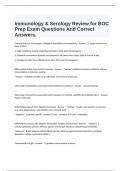Exam (elaborations)
Immunology & Serology Review for BOC Prep Exam Questions And Correct Answers.
- Course
- Institution
Characteristics of Immunogens (Antigens) that affect Immunogenicity - Answer 1. Large molecule (at least 10 KDa) 2. High complexity (simple repeating units don't make good immunogens) 3. Chemical composition (proteins and polysachs. are better than carbs, lipids & nucleic acids) 4. Foreignnes...
[Show more]



